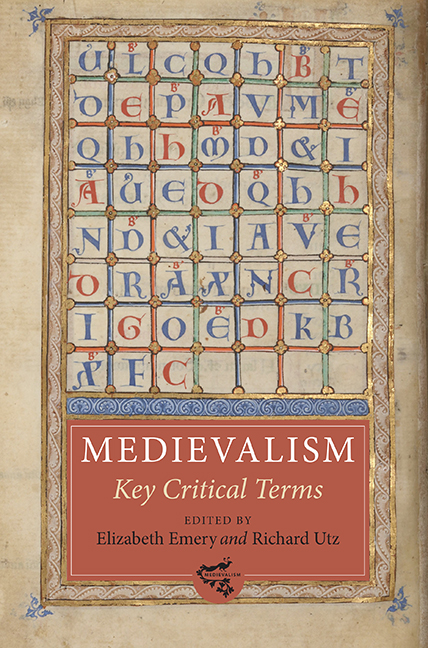Book contents
- Frontmatter
- Dedication
- Contents
- List of Illustrations
- List of Contributors
- Making Medievalism: A Critical Overview
- 1 Archive
- 2 Authenticity
- 3 Authority
- 4 Christianity
- 5 Co-disciplinarity
- 6 Continuity
- 7 Feast
- 8 Genealogy
- 9 Gesture
- 10 Gothic
- 11 Heresy
- 12 Humor
- 13 Lingua
- 14 Love
- 15 Memory
- 16 Middle
- 17 Modernity
- 18 Monument
- 19 Myth
- 20 Play
- 21 Presentism
- 22 Primitive
- 23 Purity
- 24 Reenactment
- 25 Resonance
- 26 Simulacrum
- 27 Spectacle
- 28 Transfer
- 29 Trauma
- 30 Troubadour
- Index
- Medievalism
4 - Christianity
Published online by Cambridge University Press: 08 October 2022
- Frontmatter
- Dedication
- Contents
- List of Illustrations
- List of Contributors
- Making Medievalism: A Critical Overview
- 1 Archive
- 2 Authenticity
- 3 Authority
- 4 Christianity
- 5 Co-disciplinarity
- 6 Continuity
- 7 Feast
- 8 Genealogy
- 9 Gesture
- 10 Gothic
- 11 Heresy
- 12 Humor
- 13 Lingua
- 14 Love
- 15 Memory
- 16 Middle
- 17 Modernity
- 18 Monument
- 19 Myth
- 20 Play
- 21 Presentism
- 22 Primitive
- 23 Purity
- 24 Reenactment
- 25 Resonance
- 26 Simulacrum
- 27 Spectacle
- 28 Transfer
- 29 Trauma
- 30 Troubadour
- Index
- Medievalism
Summary
WE HAVE LEARNED from structuralism that no intellectual construct can be comprehended as a monad, unique and self-sufficient, independent from all others. On the contrary, any such construct will be bound to other constructs, often in a binary position of identity or antithesis. Consequently, the notion of a Christian Middle Ages – simple, unproblematic, uniform, communal – is meaningful, indeed can exist, only when contrasted with its binary antithesis, the Renaissance, presumed to be complex, problematic, diverse, individual, and, most of all, secular. The Age of Faith set against the Age of Humanism.
Given that this notion – the simple, unproblematic, Christian Middle Ages – did not exist among the medievals, nor did it exist during the Renaissance, it can be deemed an example of medievalism. It is one of the most important medievalism phenomena, for it determines how many academics and the public at large view the Middle Ages – what it means to them. I propose that, for the most part, modern scholars launched this “myth,” and it lives on today.
The people of the Renaissance did not think in these terms at all.
There was no humanist revolution in the Renaissance. The umanisti were, first and foremost, schoolteachers. They taught grammar, rhetoric, history, and aesthetics as the increments of a general education. The assumption was always that humanistic studies would develop virtue, would make one a better and more truly Christian person. These Renaissance humanists were all Christian; a number of them were ordained priests. They were, for the most part, apolitical; they relished the contemplative life and endorsed a hereditary or elective monarchy. Oriented toward the past rather than toward the future, to the extent that they held a personal philosophy, it was Christian Neoplatonism. They were text-centered, book people. Finally, they did not envisage the Middle Ages as different from their own time with regard to faith, nor did they either praise or denigrate a Christian Middle Ages.
France was the land where great writers of the sixteenth century especially distinguished themselves, sometimes with scorn, from their “Gothic” forebears. François Rabelais denounced scholastic educational practices, and Michel de Montaigne preferred a “teste bien faite” to a “teste bien pleine” – in other words, the process, not the product.
- Type
- Chapter
- Information
- Medievalism: Key Critical Terms , pp. 35 - 42Publisher: Boydell & BrewerPrint publication year: 2014

